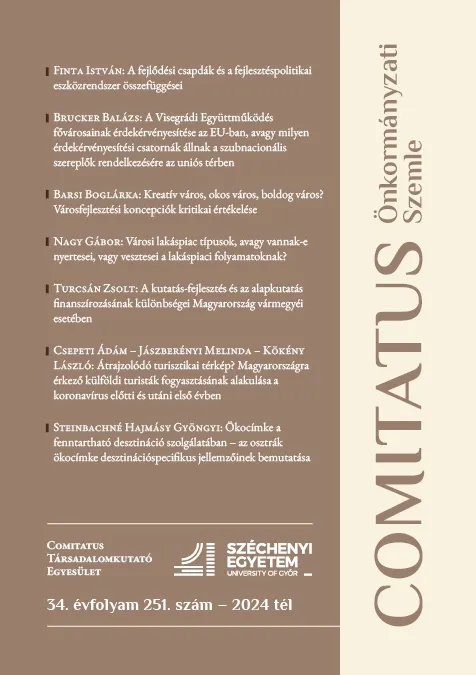A regionális gazdaságtan Thünen előtt
Regional economics before Thünen
| LETÖLTÉS | DOI: 10.59809/Comitatus.2024.34-250.27 |
|
Szerző: Dusek Tamás, egyetemi tanár, Széchenyi István Egyetem, dusekt@sze.hu,ORCID: 0000-0001-9953-2127 Kulcsszavak: regionális gazdaságtan | skolasztikusok | Cantillon | elmélettörténelem JEL kód: R10, B10 |
Author: Tamás Dusek, Professor, Széchenyi István University, dusekt@sze.hu, ORCID: 0000-0001-9953-2127 Keywords: regional economics | scholastics | Cantillon | history of economic thought JEL code: R10, B10 |
Absztrakt: A regionális gazdaságtan, és különösen a telephelyelméletek tárgyalása során rendszerint elég erőteljesen jelenik meg az elmélettörténelmi előzmények felvázolása, így Thünen, Marshall, Weber, Lösch megemlítése és valamilyen szintű bemutatása elmaradhatatlan egy általános regionális gazdaságtani tankönyvben. Ami viszont a hagyományos, klasszikus közgazdaságtan főáramát illeti, gyakori vádként jelenik meg a regionális gazdaságtan tankönyveiben, hogy „térnélküli csodavilággal” foglalkozott. Jelen tanulmány ennek a tételnek az eredetét és elfogadhatóságát vizsgálja. Időrendben nézve foglalkozik az ókori és a skolasztikus szerzők területi gazdasági elemzéseivel, részletesebben pedig Richard Cantillonnal, valamint említés szintjén néhány, a regionális gazdaságtan kánonjából kimaradt 19. századi szerző regionális gazdaságtani írásaival. A tanulmány konklúziója, hogy a „térnélküli csodavilág” nem indokolható, a területi gazdasági kérdések szerves részét képezték a preklasszikus és klasszikus közgazdászok munkásságának, de nem a tér és a távolság volt a kiindulópontjuk, hanem a gazdasági jelenségek magyarázata, amelynek során akkor vették figyelembe a távolságot és a teret, amikor az indokolt volt. A tér és a távolság a matematikai formalizmus révén került ki a közgazdaságtan főáramából a huszadik század első felében.
Abstract: In the study of regional economics, and especially of location theory, the theoretical antecedents are usually quite strongly presented, so the mention and some level of discussion of Thünen, Marshall, Weber, Lösch is indispensable in a general textbook on regional economics. As for the mainstream of traditional, classical economics, it is often accused of being a „wonderland of no spatial dimension”. This paper examines the origin and plausibility of this thesis. In chronological order, it deals with the regional economic analyses of ancient and scholastic authors, in more detail with Richard Cantillon, and at the level of mention with the regional economic writings of some 19th century authors who have been left out of the canon of regional economics. The conclusion of the paper is that the „wonderland of no spatial dimension” cannot be justified, that spatial economic issues were an integral part of the work of preclassical and classical economists, but that their starting point was not space and distance but the explanation of economic phenomena, taking into account distance and space when justified. Space and distance were brought out of the mainstream economics through mathematical formalism in the first half of the twentieth century.
IRODALOMJEGYZÉK
Blaug, Mark: The German hegemony of location theory: a puzzle in the history of economic thought, History of Political Economy, 1979/1, 21–29.
Cantillon, Richard: Richard Cantillon’s Essay on the Nature of Trade in General, A variorum edition, London–New York, 2015, 513. https://doi.org/10.4324/9781315794686
Cross, Melvin – Ekelund, Robert B.: A. T. Hadley on monopoly theory and railway regulation: an American contribution to economic analysis and policy, History of Political Economy, 1980/2, 214–233.
Dusek Tamás: Rechnitzer János, az alapító atya, Tér-Gazdaság-Ember, 2021/2, 133–134.
Edwards, Mary E.: Regional and Urban Economics and Economic Development. Theory and Methods, Auerbach Publications, Boca Raton, New York, 2007, 752. https://doi.org/10.4324/9781315088969
Ekelund, Robert B. – Hébert, Robert F.: Secret Origins of Modern Microeconomics: Dupuit and the Engineers, Chicago, 1999, 468.
Farkas Beáta: A közgazdasági gondolkodás rövid története, Budapest, 2022, 488.
Fujita, Masahisa – Krugman Paul – Venables, Anthony. J.: The Spatial Economy, Cambridge, Massachusetts, London, England, 1999, 382.
Isard, Walter: Location and Space-Economy, Cambridge, Massachusetts, 1956, 380.
Landreth, Harry – Colander, David C.: History of Economic Thought, Boston, 2002, 511.
Lengyel Imre – Rechnitzer János: Regionális gazdaságtan, Budapest–Pécs, 2004, 391.
Lowry, S. Todd: Recent Literature on Ancient Greek Economic Thought, Journal of Economic Literature, 1979/1, 65–86.
Murphy, Antoin E.: Richard Cantillon: Entrepreneur and Economist, New York, 1986, 336.
Norman, George: Economies of scale, transport costs, and location, Boston/The Hague/London, 1979, 205.
Ohta, Hiroshi: Spatial price theory of imperfect competition, College Station, 1988, 247.
Ponsard, Claude: History of Spatial Economic Theory, Berlin, 1983, 240.
Rechnitzer János (szerk.): Fejezetek a regionális gazdaságtan tanulmányozásához, Győr–Pécs, 1994, 252.
Richardson, Harry Ward: Regional Economics, London, 1969, 457.
Roncaglia, Alessandro: The Wealth of ideas, A History of Economic Thought, Cambridge, 2005, 582.
Rothbard, Murray N.: Economic Thought Before Adam Smith, Auburn, 2006, 556.
Schumpeter, Joseph: History of Economic Analysis, Oxford, 1954, 1260.
Spengler, Joseph J.: Cantillon: First of the Moderns I., Journal of Political Economy, 1954/4, 281–295.


